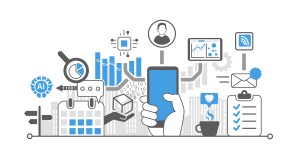
Over the past year, Canada has been making headlines around the world for its contributions to artificial intelligence, with new research centres launching and startups building their business around AI. The one part of the story that often gets ignored is what it will mean for small and medium-sized businesses.
The average SMB may tend to think of artificial intelligence software as something beyond their means to deploy, or something so transformative its impact won’t really be felt until the far-flung future.
Guess again.
With the arrival of tools like Salesforce Einstein to products such as CRM, marketing automation and customer service, the artificial intelligence definition SMBs may have in their minds needs to change. It’s not about buying a robot to take over your entire operation. It’s looking for examples of artificial intelligence that will optimize or improve business processes across every department.
Ease your way into an AI strategy by taking a few easy, iterative moves:
1. Spot The Artificial Intelligence That Lives Outside Your Office
Every small or medium-sized business is a little different in how it works and what’s important to get done. Figuring out where artificial intelligence software fits in can be a challenge at first. What about scaling that down to an individual level — yourself — and seeing what kind of AI features are most helpful in your own life?
Start by:
-
Browsing your favourite online book store. Look at what the artificial intelligence software running in the background has come up with in terms of suggested titles you might not have discovered otherwise. How could you bring a similar process of suggesting products and services to your own customers or prospects?
-
Driving somewhere new. Not exactly sure where you’re headed? That’s okay. Many smartphones feature the ability to use voice commands to ask questions to an AIpowered GPS system to plot out the best route. Some cars have this functionality built in as well. Now imagine giving similar benefits to customers who visit a physical store location (if you operate one) or who just need to find your head office for a sales presentation.
-
Enjoy some air conditioning. As the summer gets closer, many people want to cool down but they don’t to overpay on their hydro bill. That’s why there are now many smart home automation tools that will learn when you tend to be home and adjust the temperature accordingly. You can thank artificial intelligence for the comfortable results, but where could the same kind of machine learning anticipate a customer’s needs or even those of your own personnel? That’s the kind of thing you could be evaluating as you try to apply AI in a business context.
2. Study Where AI Lands In Large Companies
Even if they thrive on offering a personal touch to customers, most SMBs compete at least to some extent with much larger organizations. Whether you’re in financial services, retail, health care or some other market, you may be in a position to hear from customers and prospects how artificial intelligence is becoming a modern approach to doing things faster, more efficiently or more accurately. You could also learn about where AI lives in your rivals’ offices by reading about them in trade publications or what they say at industry events. Keep your eyes and ears open long enough and the possibilities will be obvious.
Take the restaurant sector, for instance. Many restaurants are SMBs and pride themselves on top-quality ingredients, a dynamic dining environment and friendly staff. The big restaurant conglomerates may have those characteristics too, but they could also be making use of AI to let customers order their meal before they arrive via smartphone — and even suggest new menu items they’ll love. AI could also be used to optimize how staff are scheduled, among other things.
Beyond direct competitors, many consumer applications are using AI to recommend restaurants based on location, price range and other criteria. If your business is already being affected by artificial intelligence, why not harness the technology yourself to rethink the way you market, sell and serve your customers?
3. Set A Target And A Timeline For AI Success
Every year, many SMBs hire some extra or seasonal staff to help take on additional work that piles up during their peak periods. There is always value in adding more talent to the team, but think carefully about the work you’re giving them. If there are repeatable tasks that can be automated to produce greater value, it may be time to have an artificial intelligence chat about a possible pilot project.
Lots of sales reps collect contact information and other data from prospects, for example, which need to be organized and priorities. That’s something you could give an intern — or you could give it to something like Einstein, which will not only manage the leads but look for patterns to score them more quickly and route them immediately to the right person. You’ll see more deals, closed more quickly.
The same kind of insight from artificial intelligence software could help an SMB that struggles with seeing traction in areas such as email marketing by learning what messages tend to convert into interested customers, or what kind of changes they should make to a landing page. SMBs may also find themselves always stretched in terms of people to deal with customer support calls, and AI could help considerably by predicting what kind of calls take up the most time and how to handle them more effectively.
Whatever the business case, using artificial intelligence doesn’t have to involve a complete overhaul of your company — just experiments where you’ll learn how to make the most of it and evolve.
“We’re not big enough to need artificial intelligence” doesn’t make sense anymore. As the technology becomes more widespread, customers will expect it. In fact, it may become the only way small and medium-sized businesses are able to look (and become) a lot bigger.
Are you prepared for an AI world? A cutting edge CRM solution can help. Learn more in our ebook, “AI for CRM: Everything You Need to Know.”


























